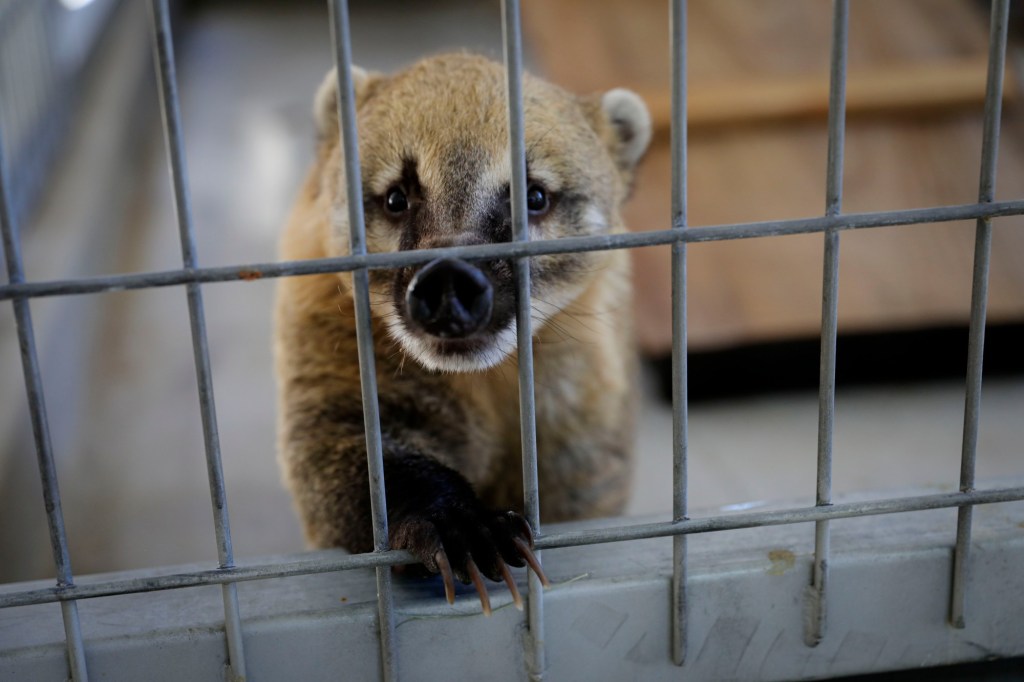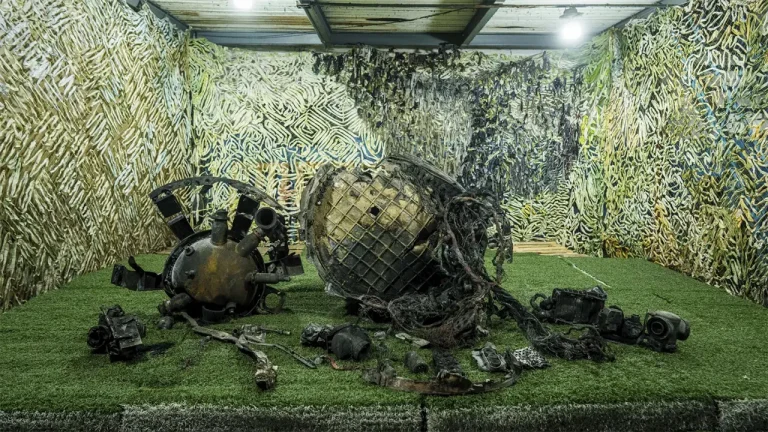
Darting back and forth in a caged quarantined area, the coatimundi appeared excited and curious as Bobbi Brink and some guests approached.
“These guys will be in here at least 30 days,” Brink said about the mammal and a potbellied pig in an adjacent enclosure. The two animals arrived at her Lions, Tigers & Bears sanctuary in Alpine on Oct. 29, and the quarantine will ensure they are free of parasites and will give them time to get to know their new keepers, Brink said.
The pig and coatimundi, which is related to raccoons and a little larger than a house cat, were the first arrivals this year and are among 65 animals and 19 species at the sanctuary.
“Every one of these animal has a story,” Brink said.
The story usually is not good. The latest arrivals, which will be named in an online contest put on by the sanctuary, had lived at the Waccatee Zoo in Myrtle Beach, South Carolina. People for the Ethical Treatment for Animals filed a lawsuit in 2022 claiming hundreds of animals at the roadside zoo, including lions, bears, parrots and lemurs, were kept in unsanitary, cramped conditions and deprived of appropriate veterinary care and shelter from the elements.
“It was a toilet,” Brink said about the Waccatee Zoo, which she described as having cobweb-covered buildings and feces everywhere. “You could tell the cages hadn’t been maintained.”
The zoo closed in September 2022, but the potbellied pig, coatimundi and a cougar were sent to another roadside zoo. PETA filed another motion to prevent more transfers, and last month the cougar went to an accredited North Carolina sanctuary and the other two were transported to Alpine.
Animals at Lions, Tigers & Bears, which is accredited by Global Federation of Animal Sanctuaries and the American Sanctuary Association, is on 93 acres that once was a cow pasture and stagecoach stop, with an old adobe still on site.
Brink and her husband, Mark, bought the property sight-unseen in 2002 to open the sanctuary.
“To help the animals and to try to make a difference,” she said when asked about her motivation. “It’s a lifetime commitment. You’ve got to live it, breathe it, eat it, sleep it.”
That commitment began by chance when Brink read classified ads in a newspaper while looking for supplies for a restaurant she planned to open in Richmond, Texas.
She noticed ads for lions, tigers and bears for sale and answered one. She met a woman living in a trailer who had tiger cubs for sale, and later found a man raising bears that were used for people to wrestle in conventions.
“From that moment on, I wanted to make a difference,” she said.
Since opening the Alpine sanctuary, Brink has worked with the U.S. Fish and Wildlife Service, U.S. Department of Agriculture, Department of Justice and state agencies that have shut down roadside zoos or are looking to place animals that might have been pets or illegally trafficked.
Among the sanctuary’s residents is Meatball, a bear that had 86,000 followers on Twitter and became famous for jumping into backyard swimming pools and raiding garbage cans in a Glendale neighborhood, despite being captured and transported 100 miles away several times.

The sanctuary also is home to Sugar Bear, who once was confined in a corn crib on an Ohio hunt ranch, a place where animals are raised to be hunted.
“Some girls stole him out of a hunt ranch and they were trying to start a sanctuary, which of course failed,” Brink said.
She also rescued another bear in Ohio that was living outside the mobile home of a couple who had 11 children.
“Sometimes you tell people this stuff, and they don’t believe it,” Brink said. “You can’t make this stuff up. Like they just look at you like you’re crazy, but it really is happening.”
Some of the stories are infuriating, such as the rap singer who was posting videos of himself beating a lion cub, which is now a full grown white tiger named Nola at the sanctuary.
A jaguar named Eddie was found in a dog crate on the side of a road when a cub. The animal had been sold to a drug dealer, but then someone was hired to kill it. Brink said that person couldn’t go through with it, and instead dumped the cub.
Besides taking in animals, Brink helps agencies capture and relocate hundreds of animals from various situations.

The most high-profile rescue was at Tiger King Park in Oklahoma, where Brink coordinated trucks and trailers to transport 70 tigers from the roadside zoo to certified sanctuaries in 2021. The zoo had been featured in the hit documentary “Tiger King” on Netflix.
Two of Tiger King’s former animals, Zoe and Jem, live at Lions, Tigers & Bears.
Besides her work at the sanctuary, Brink does public speaking on animal protection, and this year spoke at Comic-Con International and Wonder Con to advocate for using computer-generated imagery in films rather than live animals.
She also worked with legislators for 18 years for the federal Big Cat Public Safety Act, which was enacted in December 2022 to end the private ownership of big cats as pets and prohibit exhibitors from allowing public contact with big cats and cubs, among other restrictions.
Brink wasn’t happy with the final wording because it lacked enforcement and does not cover bears, wolves and primates. Last weekend, she was back at work on the subject, meeting with supporters in Los Angeles to advocate for additional legislation.
“Now we have to start over,” she said about the work ahead.







